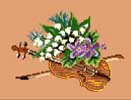
|
Romantic Music
The 19th century
is the age of Romantic composers expresses peculiar feelings associated
with the music inspired by poems, paintings, nature and stories.
The waltz is the most famous
dance of that period, in fashion in Austria, in Vienna. Johann Strauss
(1825-1899) writes the famous waltz "The Blue Danube".
In Eastern Europe the composers
look for the inspiration traditional music of their countries. This kind
of music with deep roots in traditional culture revolutionizes the art
of music.
Sometimes Romantic composers
wrote instrumental music relating a story. This is the symphonic poem,
the story being suggested by the instruments, not by the words. Franz Liszt
(1811- 1886) wrote several symphonic poems. One of his knew symphonic poem
is "Hamlet" based on Shakespeare's play.
|
Cãtãlina
Stoica
"Duiliu Zamfirescu" School,
Focsani, Romania
Teacher Petru
Dumitru
|
Frederic Francois Chopin
is one of the greatest composer and pianist of the Romantic school, regarded
by some as one of the greatest composers of piano music.
He was born in a village
six miles from Warsaw, Poland. His father, a Frenchman who had came Nancy,
was a captain in the National Guard. He conducted a private school for
the sons of the Polish nobility where Federic received his early education.
His mother, for whom he entertained profound love, was pure Polish. She
encouraged him at an early age to study music and he advanced so rapidly
that, at the age of nine years, he played a concerto at a public concert.
After the concert he seems to have been more concerned about his new collar
than the effect his brilliant playing made of the audience for he remarked
to his mother: "Everybody was looking at my collar."
In 1831, Chopin went to Paris
to make his home. It was there, in the drawing-room of the French aristocracy,
that he fascinated his hearers with that wonderful playing which earned
for him the name, "The Poet of the Piano". He was never of robust health
and during the last years of his life his frail body broke under the strain
of his concerts, teaching and social activities. He died in Paris at the
age of 39.
Cristiana
Ignat
"Duiliu Zamfirescu" School,
Focsani, Romania
Teacher Petru
Dumitru
|
Franz Liszt,
born in Raiding, Hungary, was a very delicate and sickly boy until he reached
the age of six. Then, one day, while his father was playing a "Concerto"
on the piano, little Franz came up beside him and implored him to repeat
the last movement over and over again. "What would you like to be when
you grow up?" asked his father lighting his pipe. "That man there!" said
the boy pointing to a picture of Beethoven. The next day his father began
to give him lessons. Franz spent hours practising the scales and made such
rapid progress that he played in a concert by the time he was nine years
old.
The performance was so brilliant
that everybody wanted to meet him and six of nobles present raised funds
to send him to Vienna for study with Czerny. Later "little Liszt" enjoyed
a greater triumph for, when Beethoven heard him play, he was so amazed
by Franz's wonderful technique that he went to the stage, grasped the child,
and kissed him on the forehead.
Because the little village
of Raiding was rather isolated, it became a camping place for wandering
gypsies, who, as they arrived in their wagons, would pitch their tents
in the square. At night, amid the blaze of great bonfires, the men with
violins and cymbals, and the girls in brilliant coloured dresses, and necklaces,
would dance and sing the rugged folk-tunes of Romany. Little Franz would
drink in these weirdly abrupt rhythms and melodies, which later became
so evident in his famous "Hungarian Rhapsodies".
Razvan Neacsu
"Duiliu Zamfirescu" School,
Focsani, Romania
Teacher Petru
Dumitru
|
|
Carl Czerny was
born in Vienna, Feb. 21, 1791.
His farther who was a music
teacher, taught him to play the piano, and later, he received instruction
from Beethoven. At the age of twenty-five, a European concert tour was
planned for him but there were so many disturbances because of war in Europe,
that the public appearance was abandoned. He, therefore, decided to devote
all his time to teaching. His success was remarkable and among many noted
artists to receive their training from him was the celebrated Franz Liszt,
the greatest pianist that ever lived.
As a composer, Czerny published
over one thousand works of which his many studies for the piano have been
used steadily year after year.
Stefan Bobia
"Duiliu Zamfirescu" School,
Focsani, Romania
Teacher Petru
Dumitru
|